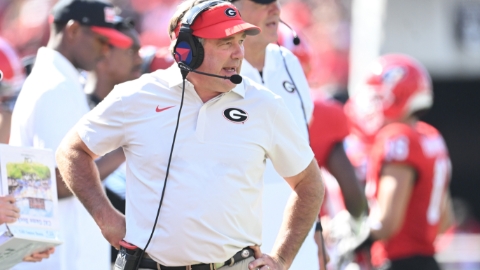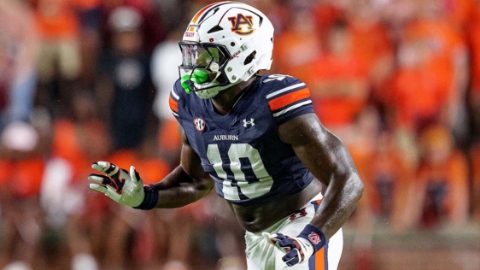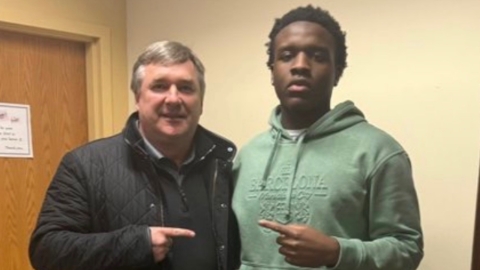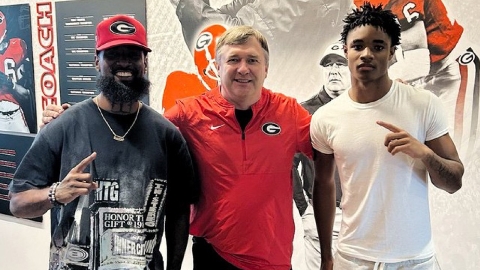Kirby Smart: "Everything Will Be Judged by the Way We Finish"
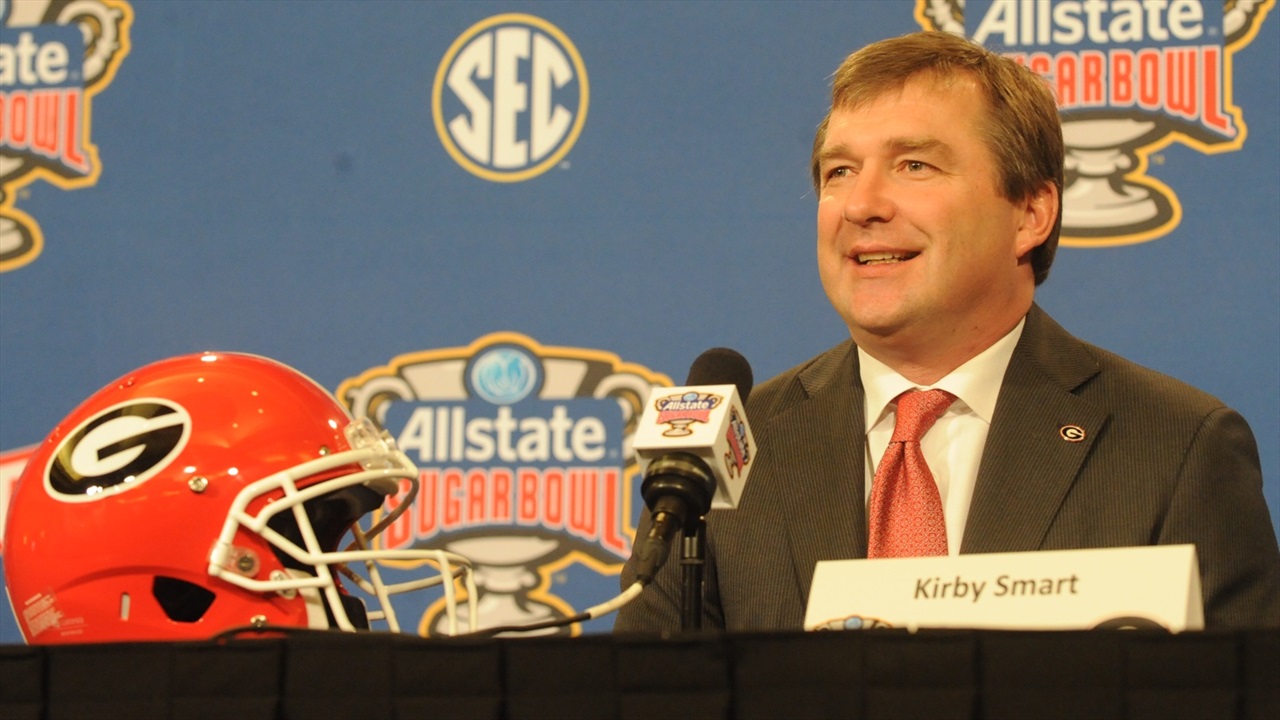
COACH SMART: I'd like to open with a special thanks to the City of New Orleans. Our team has thoroughly enjoyed our time here. Weather has not been perfect, I would say that. But we certainly have had a great time. Our kids have commented on several of the events.
The Allstate Sugar Bowl has been gracious in taking really good care of us. I know my family has enjoyed it and our staff and athletic department have thoroughly enjoyed being here. It's one of the first‑class bowls in the country, always has been. And Georgia has great tradition and history here with the Allstate Sugar Bowl.
I'd also like to take this opportunity to wish Coach [Mark] Richt a happy retirement. He's meant a lot to me in my career, hired me, and has been very thorough and helpful in my career and has been a big beneficiary to the University of Georgia. Has given so much back to the University of Georgia and been such a good man and leader of this institution. We wish him well in his retirement.
Also, Ben Watson whose 15‑year career in the NFL is coming to an end. And he's such a great representative. He spoke to our team last year in one of the most compelling talks that we've ever had. And we hope to get him back a lot more now that he's got some more free time coming up after this season. So I'm excited about those guys.
So as we look at Texas and this opportunity our team has, I think the opportunity in front of our team is as grand as there is, as there can be, because for our guys they're looking at it as an opportunity to play to a standard, to make a statement, to play to the excellence that we try to create at the University of Georgia. They've got an opportunity to do that against one of the top programs in the country.
The guy that just walked out of here, Tom Herman, I've had immense respect for, for a long time. Saw what he did firsthand at Ohio State with the offense. That led to Houston where he had an unbelievable coaching career, did a great job. And now he is turning Texas around. I know the standard that he has. I know the way they practice. I know the leadership qualities he has, and I know the recruiting base he has. So we know we're up against a very, very, very respectable opponent who does a great job on both sides of the ball and special teams. So our kids acknowledge that.
The last I guess 30 days, 31 days, whatever it's been since our last game, have been wild and crazy because there's been a lot of action, in all of college football but especially with the University of Georgia. And we're really excited to get back out on the field and play a game.
Q. You've got two physical receivers in J.J. (Jeremiah) Holloman and Riley Ridley. That said, how have they been able to prepare you in defending Texas tall receivers Lil'Jordan Humphrey, 6'4", and 6'6" Collin Johnson? Have they been able to give the secondary the looks they needed in practice to defend two guys like that?
COACH SMART: I don't know if you'll actually know that until the game because those two receivers for Texas are as big and as physical as we've faced all year. They do a great job of mixing those guys up and moving them around and creating matchups for them.
They've got a lot of secondaries in the Big 12 who have pressed them. They've got guys who played off of them. Those wideouts are elite wideouts, and they're not just elite because of their ability to catch. They're physical. They block. They're tough.
We've faced some big wideouts a couple times at LSU. We've faced some wideouts of good size in our offense but none quite like these two. So this dynamic will be unique, and we tried to simulate that but not necessarily with just Riley and J.J. We've had Matt Landers and Tommy Bush who were good size‑wise, maybe not the bulk as those two, but we've been able to get some good matchups and some good contests out there with those guys.
Q. Without Deandre Baker, how difficult has it been adjusting with a new look secondary this week and has Deandre contributed to any game prep?
COACH SMART: Deandre has done a great job from a leadership standpoint, confidence standpoint for those guys. As far as the difficulty of preparing for it, the difficulty comes tomorrow because he's not out there. The prep so far has not been difficult because he's not there; it's been concerning because you've got a little bit more unknown when he's not out there. You feel really comfortable the last however many games, three years, that Deandre is going to control his side of the field.
Now you've got not two new guys ‑‑ two guys that have experience ‑‑ they don't have the experience of Deandre Baker ‑‑ who get an opportunity to go out and play. And that's probably the most exciting thing, seeing those guys play.
Q. We had a chance to ask Jim [Chaney] about this yesterday, kind of a whirlwind‑type thing with Stetson Bennett now rejoining your program. This is the first time we've had a chance to ask you about it. What did you guys see in that and bringing him back? And I know you guys tried to hold on to him before he left the first time. How excited are you to bring a guy like that back who you know so well?
COACH SMART: I'm very excited. I think any time you get a chance to bring someone in your program who is a proven commodity that you know what they stand for, you know how they practice each day, you know how they come to work, and you know his love for the University of Georgia ‑‑ here's a young man who grew up in state, had an opportunity to go to several universities, chose to come to Georgia as a walk‑on. Really played well. Earned a scholarship. Decided to go to a junior college, played well there. Led his team to a championship game.
Now he's got an opportunity to come back into a very similar system that he left, and I'm proud of the fact that we were able to get him to come back because he had other opportunities. And we're looking forward to working with him.
Q. Could you update us on D'Andre Walker and Jordan Davis, their status for the game? And, two, when you said the team was going to play to make a statement, what is the statement? Is it that Georgia was one of the four best or another type of statement?
COACH SMART: I think any time you think standard and statement for us, it's really speaking to the fact that we want to play to our brand of football, to our level of competition.
Make no bones about it, they're representing their conference. We're representing our conference, and that's always a challenge, everybody plays the SEC with a chip on their shoulder. So we're coming to play to a standard and make a statement to ourselves that we are an elite program. We want to be considered that. We want to be in that conversation. And I think to do that, you've got to play to a standard. And that's our goal for our kids.
As far as the injuries, D'Andre Walker struggled a little bit. His groin has been bothering him, hasn't been able to go full speed. He'll be a game‑time decision, maybe situational, the route we're using.
And then Jordan Davis has kind of been the same. May be a situational player that he can play in certain situations. But to be honest, both these guys have struggled to get back 100%.
Q. You mentioned about some wild and crazy times since the SEC Championship game. Can you tell about the level of how locked in your team is to this game? And is that hard to gauge for bowl teams?
COACH SMART: I don't think it's anything to do with the bowl game. I think it's week to week you would question as a head coach where are we from a standpoint of focus and concentration. I don't think you ever know that.
With that much time, it makes it a lot harder because you really don't really want them focused on the bowl game for 30 days. You want them focused on getting better for 20‑25 of those days. They've got to concern themselves with final exams, decisions they have to make, so many other things going on.
We just want to coach and get better. The last, I would say, ten days we really focused on Texas, and our kids have understood that. They have understood the importance of that.
You want to grow that momentum into the game to the excitement of the game. 8:45 kickoff, nationally televised audience, only game going on. We want those kids ready to go play. We want to have good tempo when it comes to that.
I certainly have confidence in our kids' focus and concentration, they turn the tape on. They see Texas beating Oklahoma and get on top of Oklahoma in a championship game who is a team we have a full amount of respect for and understand the caliber of a team like Texas.
Most of our kids nowadays, they grew up and got recruited with those same kids from Texas. They went to all‑star games. They know every one of these players, and they know these guys are good football players. It's not about that for us. It's about how we play and how we control our standard.
Q. Do you like the current targeting rule, or do you think it's too punitive and needs to be adjusted? How the hell do you coach tackling anymore?
COACH SMART: It's hard to coach tackling. It's hard to be argumentative with a rule that's meant to provide safety. When you look at it from a standpoint of: Does your child play football and how would you want your child coached in football, I certainly don't want anybody teaching my son to lead with a helmet or crown of a helmet.
I think the hardest part is the judgment of mid‑level targeting, where we're trying to go for the middle of a person and they move. And all of a sudden you end up with a targeting. That's the toughest thing, but that's part of the game. And you can't say well, I'm going to make it okay for this one but not okay for this one. So it's a fine line. It's really tough.
As long as it's making our sport safer because what I hate to see is injuries deter a sport that I think is really good for people. I think this sport teaches you so many life lessons that because it's got some injury and stuff in it, we've got to do a really good job of protecting our players on both sides of the fence.
But tackling is tough. In bowl games in particular we've talked really hard, showed examples every day of how tackling disappears during bowl games.
Q. First of all, what have you learned as a coach in terms of how you get kids to rebound from disappointment? And then, also, is there anything in particular about this season that you think will help the players who are returning next year, next season?
COACH SMART: First thing, I think disappointment is a part of life. I think everybody in this room can say they've been disappointed at some time or another, they've been let down. But it actually makes, when you do things well, that much grander because if you just won all the time or you just had success all the time, you'd never feel the agony of that disappointment. So we have to embrace that in order to really enjoy the other side of it, which is what we do this for.
The comeback is what's you do this for. So this is our opportunity to go out and finish it and do it the right way, and we want to do that.
As far as what our players have learned from this season that might help them next year, I think the biggest thing is focus and concentration on every game. For us we played in a tough, hostile environment at LSU and we didn't play our best game. We didn't coach our best game, me in particular. So I think when you start with that, you've got to be at your best every single game because, in the end, they all matter, especially in the SEC. So whether it's that game, another game, you've got to continue to grow and get better, which I really feel like our team developed and got better throughout the year. And we've got to continue to do that next year.
Q. What are you going to remember about this year's senior class? And what's going to be your message to them tomorrow night before you take the field?
COACH SMART: I think the biggest thing is they can leave a lasting legacy and what is your legacy going to be? They've got a chance to be the second or tied for the second‑winningest senior class to come out of this program, which is pretty amazing when you think about it. They've also got the beneficiary of more games than some of the past teams in the '80s. But it's pretty incredible what they've been able to do in a short time.
And I want them to think about how do you want to be remembered? What do you want people to say about you? You want them to say that you went out and laid everything on the line and competed as hard as you could because a lot of these seniors, this will be their last football game. And I want them to have a positive taste in their mouth, and I want them to be able to come back to the University of Georgia and be proud of the fact that they were able to win a New Year's Six bowl. And I think that's really important.
Q. This is more question about the progression and evaluation of practices. But there's some things up in the air with Isaac [Nauta] and Luke Ford as they go forward. What type of things do you see from those other guys who maybe haven't gotten the opportunity to contribute this year and how they might be an asset going forward?
COACH SMART: First off, I think Charlie Woerner does a tremendous job. Charlie is one of the most athletic, physical blockers, especially for a guy that played every position in high school football defense, receiver, everything. He grew into a tight end body, and he's one of the toughest, hardest workers who never complains, never says a word in practice. He just works. He's gotten a lot better throughout his career and will continue to do so.
Throughout these bowl practices, John FitzPatrick has made a bunch of plays. He's had to do probably the toughest job on our team. He doubles as a tight end on the scout team. He's had to play some tackle on the scout team due to a number of injuries on the offensive line throughout the season. But he's grown and gotten better. I think when you put those two guys out there, they both have a chance to help us. And that's with the stuff we've got up in the air you mentioned.
Q. Mel Tucker, defensive coordinator, now head coach at Colorado, will you be calling defensive sets in this game?
COACH SMART: We'll be doing it by committee as we talked about. We've got a group and a staff that work really hard together. Between Dan [Lanning], [Glenn] Schumann, Tray Scott, myself, the GAs work really hard. Both Wendel [Davis] and Bakari [Guice] have done a great job of stepping up and helping from that standpoint.
We do it by committee most of the time anyway. Mel called the defenses for us. But between series, during the week game planning, it was done by committee because that's how you put a game plan together. But that's very similar to how it will be done in this game.
Q. Wonder your thoughts on the two Playoff games the other day. Anything that you saw that further validated your opinion you should have been one of those teams taking part?
COACH SMART: I'll be honest with you, we were practicing and working during the Clemson‑Notre Dame. So we finished somewhere around the third quarter. I didn't get to see hardly any of that. We came in as coaching staff and watched the tape.
I got to see some of the Alabama and Oklahoma game and certainly thought that both these teams were really powerful offensive football teams and played a good football game.
But our concern, as you well know, is with Texas. And everything that we'll be judged on is how we finish, and we want to finish the right way. And we want to play our best football game at the end of the year, which is tomorrow night.
Q. You talked about Mark Richt at the top of the press conference. What did he mean to you on a personal level, and then, I guess, what do you recall when he kind of hired you in '05 or whatever?
COACH SMART: Mark has been great for my personal career because I got to meet what is now my wife during my time coming back to the University of Georgia. He gave me an opportunity to coach on the offensive side of the ball, which I've always said was a different perspective for me.
Neil Calloway was the offensive coordinator, and Mike Bobo was the quarterbacks coach. And they fought to hire me when there was a defensive position on the staff I didn't get hired for, Mark had enough confidence in me as a coach and recruiter to hire me as running backs coach. And it's one of the most valuable years of my career because it was the most different, and I wouldn't have had that opportunity were it not for him and his wife Katharyn. What they've gone for the city of Athens and University of Georgia is incredible, and they're great people.
Q. You touched on this a bit at the beginning of your opening statement. But how was the perception of Texas as a program maybe changed from where it was when Coach [Tom] Herman first took the job?
COACH SMART: That's a tough one because I don't really know where that perception was when he took the job. We didn't play him the time I was at Alabama, and we didn't really play him since I've been at Georgia. So we've kind of overland since he took over.
I think the national brand of Texas has stepped up with some of the bigger games they've been able to play in. I know from a recruiting standpoint we've gone head to head because he's come to Georgia and recruited nationally. He's come to Florida and recruited nationally. And we've gone to Texas. So we've had more times that we've actually crossed paths than I ever remember during my time at University of Alabama. So he's done a tremendous job from that standpoint.
They've never really gone anywhere from a standpoint of football players looking at football players. These kids look at things completely different than the men and women in this room including myself because they have a generation of going to play in all‑star games and having social media as a format in which they interact with these kids on other teams. They know these kids on other teams, and they know the caliber of football players. They see the track times in Texas. They see the all‑star games in Texas. They know there's high‑quality football players in the state of Texas.
Q. With D'Andre Walker limited, who stands to benefit from additional playing time? And talk about the confidence you have in those individuals.
COACH SMART: Behind him we've got a group of freshmen that have all kind of played different roles throughout the year with Brenton Cox, Robert Beal. Azeez [Ojulari] getting an opportunity to work in that group, too, with the time we've had ‑‑ extended time we've had to practice getting him prepared.
And then you got to look at Malik Herring and other guys that play defensive end. It will be done by committee and hopeful to get the most and best out of those young players who are going to get an opportunity to play.
Q. You talk about the importance of the extra practices. Who kind of stood out last year and took advantage of that extra time? Has it been one of the youngsters on your squad who has made the most of these extra opportunities this year?
COACH SMART: The first one that comes to mind would be Azeez [Ojulari]. We were going to work on us for five, six practices ‑‑ we call them camp practices ‑‑ where we would work on Texas a little bit. But Azeez is a kid that came out with an attitude of "I'm going to go play. I'm want to get better." He did a great job of that.
Channing [Tindall] and Quay [Walker]. I think the young O‑linemen really grew up. Y'all saw them most of the year in Cade Mays and Trey Hill. But those guys grew up a lot. I thought Tommy [Bush] and Matt [Landers] made strides as football players. So when you look across the board ‑‑ John FitzPatrick, I mentioned him earlier during bowl practices.
A lot of guys start to step to the forefront and get an opportunity to hear things a second and third time where they're not overwhelmed at the speed of the install. They start making some plays and you realize, hey, this guy is a really good football player. He's going to be able to help our team at some point.
